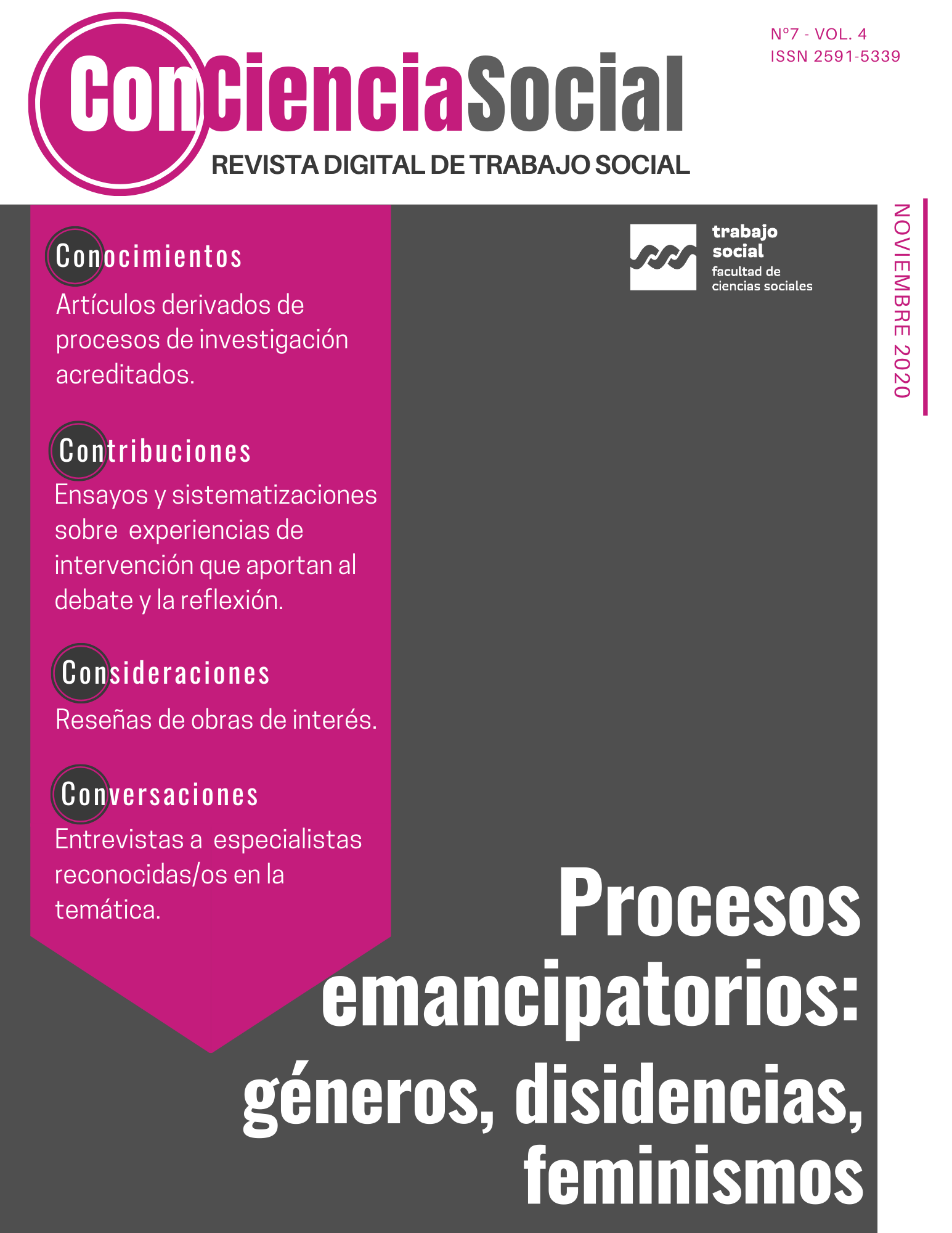Intersectionality: a concept adaptable to the ethnic reality of Colombia
Keywords:
social exclusion, intersectionality, violence, women, feminismsAbstract
The concept of intersectionality is positioned from the seventies of the twentieth century and its appropriation comes from the criticism made by the Multiracial American Feminist Movements to observe how the legal system neglects the claims, especially of black women, exposed to the violence and social exclusion. In this sense, the purpose of this article is to observe the applicability of the concept of intersectionality as a theoretical body that allows identifying the different social demands in Latin America from which ethnic minority Afro-descendant groups have had to enforce in order to give their voice of alert against different violent manifestations that have oppressed them and that have occurred for many years in countries like Colombia. In order to achieve this objective, it is necessary to know the origin of the concept of intersectionality and the influence of women in this historical process, who have identified and united the different forms of social exclusion, as well as the way in which their social claims must be heard to achieve greater legal equity as citizens of a rule of law.
Downloads
References
Alanen, Leena (2016): Intersectionality and other challenges to theorizing childhood. Childhood, 23 (2), 157-161. Recuperado de:
https://journals.sagepub.com/doi/10.1177/0907568216631055. Fecha de consulta: 8 de mayo de 2019.
Angulo Ramírez, Diana (2017): Acción colectiva e interseccionalidad en la Red Nacional de Mujeres Afrocolombianas Kambirí. Tesis de maestría no publicada, Universidad Colegio Mayor de Nuestra Señora del Rosario, Bogotá, D.C.
Auma, Maisha-Maureen (2019): Reach Everyone on the Planet: Kimberlé Crenshaw and Intersectionality Gunda Werner Institut in the Heinrich Boll Foundation and the Center for Intersectional Justice.
Bilge, Sirma (2010): Recent feminist outlooks on intersectionality. Hypatia Reviews, 57 (1). Recuperado de: https://journals.sagepub.com/doi/10.1177/0392192110374245. Fecha de consulta: 1 de agosto de 2019.
Blanco, Jacqueline & Cárdenas, Margarita. (2009): Las mujeres en la historia de Colombia, sus derechos, sus deberes. Prolegómenos. Derechos y Valores, (23), 143-158.
Carastathis, Anna (2017): Intersectionality: Origins, Contestations, Horizons. Lincoln: University of Nebraska Press.
Church, Mary (1940): A Colored Woman in a White World. Washington, D.C: Humanity Books.
Cooper, Anna Julia. (2017): A Voice from the South: by a Woman from the South. Chapel Hill: University of North Carolina Press.
Davis, Angela (1972): Reflections on the Black Woman´s Role in the Community of Slaves. The Massachusetts Review, 13, (1-2), 81-100. Recuperado de: https://www.jstor.org/stable/25088201. Fecha de consulta: 1 de abril de 2019.
El-Tayeb, Fátima (2019): Reach Everyone on the Planet: Kimberlé Crenshaw and Intersectionality. Gunda Werner Institut in the Heinrich Boll Foundation and the Center for Intersectional Justice.
Evans, Mary &Williams, Carolyn (2013): Intersectionality. Routledge, Abingdon.
González, Leonardo & Delgado, Cristian Raúl (2018): Homicidio de defensores y defensoras de paz: una tragedia que no se detiene. Ideas Verdes (6), 2-10. Indepaz, Bogotá.
Hancock, Ange-Marie (2007): When multiplication doesn’t equal quick addition: examining intersectionality as a research paradigm. Perspectives on Politics, 5 (1), 63-79. Recuperado de: https://doi.org/10.1017/S1537592707070065. Fecha de consulta: 5 de junio de 2019.
Hankivsky, Olena & Cormier, Renée (2009): Intersectionality: Moving Women’s Health Research and Policy Forward. Women’s Health Research Network. Vancouver.
Hankivsky, Olena (2012): An Intersectionality-Based Policy Analysis Framework. Institute for Intersectionality Research and Policy-Simon Fraser University. Vancouver.
Hill Collins, Patricia (2015): Intersectionality’s definitional dilemmas. The Annual Review of Sociology, (41), 1-20. Recuperado de: 10.1146/annurev-soc-073014-112142. Fecha de consulta: 14 de enero de 2019.
Jiwatram, Tina (2016): Invisible Intersections of Gender based Violence among High Risk. Columbia University. New York.
Keeanga-Yamahtta,Taylor (2017): How we Get Free: Black Feminist and the Combahee River Collective. Chicago: Haymarket Books.
La Barbera, María Caterin (2016): Interseccionalidad, un “concepto viajero”: orígenes, desarrollo e implementación en la Unión Europea. Interdisciplina, 4(8), 105-122.
Marion, Iris (2014): Five Faces of Oppression. State University of New York Press. Albany.
Mattsson, Tina (2014): Intersectionality as a useful tool: anti-oppressive social work and critical reflection. Journal of Women and Social Work, 29 (1), 8-17. Recuperado de: DOI: 10.1177/0886109913510659. Fecha de consulta: 5 de marzo de 2019.
Medina García, Paula (2018): Mujeres, polifonías y justicia transicional en Colombia: narrativas afrocéntricas de la(s) violencia(s) en el conflicto armado. Investigaciones Feministas, 9 (2), 309-326. Universidad Complutense de Madrid.
Restrepo, Eduardo & Rojas, Axel Alejandro (2008): Afrodescendientes en Colombia: compilación bibliográfica. Universidad del Cauca. Popayán.
Viveros, Mara. (2016): La interseccionalidad: una aproximación situada a la dominación. Debate Feminista, (52), 1-17. México.
Vuola, Elina. (2002): Limits of Liberation: Feminist Theology and the Etics of Poverty and Reproduction. Sheffield Academic Press. New York.
----------------- (2012): Intersectionality in Latin America? The possibilities of intersectional analysis in Latin American studies and study of religion. En Lundgren Silje, Machado Thais & Widmark Charlotta (Eds.), Bodies and Borders in Latin America (pp. 131-151). Stockholms Universitet-Institute of Latin American Studies. Stockholm
Walby, Sylvia & Armstrong, Jo (2012): Intersectionality: multiple inequalities in social theory. Sociology, 46 (2), 224-240. Recuperado de: https://doi.org/10.1177/0038038511416164. Fecha de consulta: 28 de febrero de 2019.
Williams, Kimberle (1989): Demarginalizing the Intersection of Race and Sex. University of Chicago.
------------------------(1991): Mapping the margins: intersectionality, identity politics, and violence against women of color. Stanford Law Review, 43 (6), 1241-1299. Recuperado de: http://www.jstor.org/stable/1229039. Fecha de consulta: 5 de marzo de 2019.
Otros documentos consultados
Combahee River Collective (s.f.): Génesis. Combahee River Collective. Recuperado de: https://combaheerivercollective.weebly.com/history.html. Fecha de consulta: 21 de mayo de 2020.
Gunda Werner Institut (2019): Intersectionality. Berlín: Heinrich Böll Foundation.
National Park Service. (2019). Sojourner Truth. Recuperado de: https://www.nps.gov/people/sojourner-truth.htm. Fecha de consulta: 18 de enero de 2019.
Observatorio para la Protección de los Defensores de los Derechos Humanos (2018): Informe de Misión de Investigación. Colombia: no hay paz para las personas defensoras de derechos humanos. París: Federación Internacional de los Derechos Humanos-Organización Mundial contra la Tortura.
Ohio American Antislavery Society (1851): Anti-slavery bugle. Chronicling America: Historic American Newspapers. Recuperado de:
https://chroniclingamerica.loc.gov/lccn/sn83035487/1851-06-21/ed-1/seq-4/. Fecha de consulta: 15 de enero de 2019.
Organización de Naciones Unidas. (2019). Violations of Afro-Colombians’ Gender-based Human Rights. Geneva: UN.
Downloads
Published
Issue
Section
License
Copyright (c) 2020 Nurys Martínez Guerra y Carlos Martínez

This work is licensed under a Creative Commons Attribution-ShareAlike 4.0 International License.
Aquellos autores/as que tengan publicaciones con esta revista, aceptan los términos siguientes:Los autores/as conservarán sus derechos de autor y garantizarán a la revista el derecho de primera publicación de su obra, el cuál estará simultáneamente sujeto a la Licencia de reconocimiento de Creative Commons que permite a terceros:
Compartir — copiar y redistribuir el material en cualquier medio o formato
Adaptar — remezclar, transformar y construir a partir del material para cualquier propósito, incluso comercialmente.
La licenciante no puede revocar estas libertades en tanto usted siga los términos de la licencia.Los autores/as podrán adoptar otros acuerdos de licencia no exclusiva de distribución de la versión de la obra publicada (p. ej.: depositarla en un archivo telemático institucional o publicarla en un volumen monográfico) siempre que se indique la publicación inicial en esta revista.
- Se permite y recomienda a los autores/as difundir su obra a través de Internet (p. ej.: en archivos telemáticos institucionales o en su página web) después del proceso de publicación, lo cual puede producir intercambios interesantes y aumentar las citas de la obra publicada. (Véase El efecto del acceso abierto).
Los derechos de explotación comercial (Copyrigth) quedan reservados para los autores.















